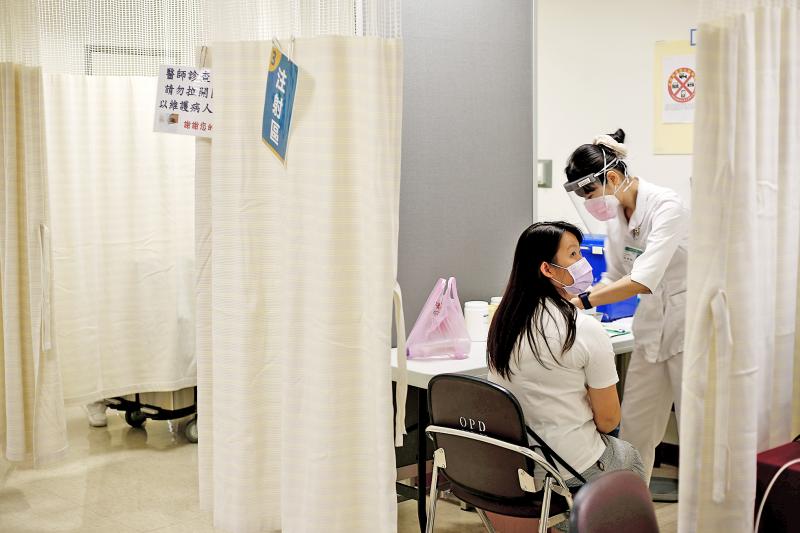US assistance securing more COVID-19 vaccines could serve to protect the critical semiconductor industry at a time of tight chip supplies globally and a rising number of infections in Taiwan, a senior Taiwanese official in New York said in an interview on Thursday.
“While for now the uptick [in COVID-19 cases] hasn’t had an impact, if it lasts too long there could be logistical problems,” Taipei Economic and Cultural Office (TECO) Director-General James Lee (李光章) said. “That’s why it’s urgent. We hope the international community can help release vaccines as soon as possible to help control the outbreak.”
Beyond the humanitarian plea for help fighting the pandemic, Lee’s argument might resonate because of deep concern in US government and business about the shortage of chips used in everything from mobile phones to automobiles.

Photo: Ritchie B. Tongo, EPA-EFE
Taiwan is facing hundreds of untraceable infections after a year of being one of the biggest success stories of COVID-19 containment.
The new surge has been confined so far mainly to Taipei and New Taipei City, and has not affected the operations of major technology firms, including Taiwan Semiconductor Manufacturing Co (台積電), as most of their operations are located farther south.
However, a drought has left hydroelectric plants operating at limited capacity, contributing to power outages in major cities across the nation, including locations where the world’s biggest computer chip businesses operate.
The government earlier this week pledged to try to keep the world supplied with chips and projected a limited impact from its worst outbreak so far. Keeping up production is critical not just for Taiwan’s growth, but because the nation is the world’s main supplier of advanced computer chips.
The concentration of chip manufacturing in Taiwan and a global shortage fueled in part by the COVID-19 pandemic has quickly become a geopolitical issue, with governments around the world racing to secure additional supplies and vowing to build their own locally based chipmaking industries.
Although Taiwan has ranked among the top places in the world in its handling of the pandemic, it has been slower to acquire and distribute shots. So far, only 700,000 doses of AstraZeneca PLC’s COVID-19 vaccine have been delivered to Taiwan.
Representative to the US Hsiao Bi-khim (蕭美琴) yesterday said that she was trying to ensure that Moderna Inc shots the government has ordered arrive next month.
The government is also in talks with the White House to obtain a portion of the 20 million doses of COVID-19 vaccines US President Joe Biden pledged to donate.
Biden on Monday announced that his administration would send doses of the Pfizer Inc/BioNTech SE, Moderna Inc and Johnson & Johnson vaccines, on top of 60 million AstraZeneca doses he had already planned to give to other countries.
“We have talked to the Biden administration and we work closely together,” Lee said. “We expect them to help.”
“The US government has been very supportive of Taiwan and that is under their consideration. We expect that pretty soon the White House will have a decision,” he added.
Additional reporting by Reuters

A Ministry of Foreign Affairs official yesterday said that a delegation that visited China for an APEC meeting did not receive any kind of treatment that downgraded Taiwan’s sovereignty. Department of International Organizations Director-General Jonathan Sun (孫儉元) said that he and a group of ministry officials visited Shenzhen, China, to attend the APEC Informal Senior Officials’ Meeting last month. The trip went “smoothly and safely” for all Taiwanese delegates, as the Chinese side arranged the trip in accordance with long-standing practices, Sun said at the ministry’s weekly briefing. The Taiwanese group did not encounter any political suppression, he said. Sun made the remarks when

The Taiwanese passport ranked 33rd in a global listing of passports by convenience this month, rising three places from last month’s ranking, but matching its position in January last year. The Henley Passport Index, an international ranking of passports by the number of designations its holder can travel to without a visa, showed that the Taiwan passport enables holders to travel to 139 countries and territories without a visa. Singapore’s passport was ranked the most powerful with visa-free access to 192 destinations out of 227, according to the index published on Tuesday by UK-based migration investment consultancy firm Henley and Partners. Japan’s and

BROAD AGREEMENT: The two are nearing a trade deal to reduce Taiwan’s tariff to 15% and a commitment for TSMC to build five more fabs, a ‘New York Times’ report said Taiwan and the US have reached a broad consensus on a trade deal, the Executive Yuan’s Office of Trade Negotiations said yesterday, after a report said that Washington is set to reduce Taiwan’s tariff rate to 15 percent. The New York Times on Monday reported that the two nations are nearing a trade deal to reduce Taiwan’s tariff rate to 15 percent and commit Taiwan Semiconductor Manufacturing Co (TSMC, 台積電) to building at least five more facilities in the US. “The agreement, which has been under negotiation for months, is being legally scrubbed and could be announced this month,” the paper said,

Japan and the Philippines yesterday signed a defense pact that would allow the tax-free provision of ammunition, fuel, food and other necessities when their forces stage joint training to boost deterrence against China’s growing aggression in the region and to bolster their preparation for natural disasters. Japan has faced increasing political, trade and security tensions with China, which was angered by Japanese Prime Minister Sanae Takaichi’s remark that a Chinese attack on Taiwan would be a survival-threatening situation for Japan, triggering a military response. Japan and the Philippines have also had separate territorial conflicts with Beijing in the East and South China